- Home
- Cooper-Posey, Tracy
Wait (Beloved Bloody Time) Page 3
Wait (Beloved Bloody Time) Read online
Page 3
It was astonishingly good to see her.
Natália pushed her lips together in an expression that was very close to a pout. “I stayed in Savannah for a year or so, establishing my new life. Then I moved to Albany.”
His breath caught. “Home,” he murmured. He glanced at her.
“You spoke about home with such longing. I could almost see it even before I arrived there.” She smiled at him. “It has grown into a thriving city now.”
Christian drew in a slow breath and let it out. “You went there because of me.”
She kept her gaze on the pavement ahead of her for three more steps. “Let’s walk through Central Park,” she suggested.
“It looks crowded,” he said, glancing at the leafless tree branches and the many people strolling the paths beneath.
“No more crowded that this sidewalk.” She steered him toward the corner.
“You’re changing the subject.”
“If you were a gentleman, you would let me change the subject without challenge, now, wouldn’t you?” She said it with a soft southern drawl and tilted her head at him coquettishly.
The accent and the charming little tilt of her chin sent his mind tumbling back more than thirty years. He could almost feel the heat of late summer on his skin, and the smell of ripe peaches as he plucked them from the tree and placed them in the basket. The sound of steamboats working their way along the river, the slosh of the paddlewheels making his throat dry at the thought of the cool water. The slap of the screen door as Amelia, the youngest of his brothers and sisters, raced from the house down the path to the orchard, to tell him lunch was ready—
“Christian?”
He blinked, as the sounds of Fifth Avenue brought him back to the present moment.
“Where did you go, just then?” she asked softly. “Home, again?”
He wrestled with his answer as they stepped onto the path that meandered across the crisp lawn toward the leafless trees reaching up into the iron grey sky.
“It is quite normal to be homesick in the beginning, you know,” she added gently.
“Is there anything normal about this existence?” he asked, his voice rough.
Her fingers pressed his arm, but she didn’t answer.
The silence stayed with them until they were under the trees. There were a lot of couples and families out walking, taking in the fresh, crisp air, and there was a gay and festive atmosphere, despite the cool weather.
Christian blew out a breath. “Please accept my apology,” he told her. “I’ve spoiled the mood.”
“You’ve had a hard few years,” she said. “It seems to me to be only natural to feel at odds with everything and everyone.”
“You pulled through just fine,” he pointed out. “Better than fine. You look quite glorious, in fact.”
She smiled at him, then her smile faded. “I keep thinking about how hard it was for some of the men I nursed. How many families won’t have their soldiers returning home from this? A bit of hard work seems like heaven in comparison.”
Christian grimaced, guilt touching him. “You make me sound terribly ungrateful.”
“That wasn’t what I meant.”
“But you’re right. We’re lucky to not have families to miss us. Bullets don’t hurt us. There is never any need to worry or wonder about when it might all unexpectedly end. There’s just time. Lots and lots of time.”
“Time to do whatever you want,” she added.
He halted and drew her to one side of the path, facing him and out of the way of everyone else using it. “What will you be doing next?” he asked.
Natália smiled. “I am on duty in two hours. The evening shift.” She lifted the cap and veil she had folded in her hand.
“I mean, after this. Are you going to stay in New York?”
She shifted on her feet, as if she was uncomfortable with the question. Her gaze flickered away from him.
“What is it?” he asked her.
She shook her head, still not looking at him.
Christian closed the few inches between them, until they were almost touching, and caught her face in his hands. She was neither hot nor cold to his touch. He brought her face back until her gaze was on him. She bit her lip.
“What troubles you, Tally?” he asked, as gentle as she had been with him.
She pressed her full lips together, her eyes locked on his. “I try not to follow my impulses,” she said. “They usually lead me into situations I don’t like.”
“What impulse are you fighting now?”
Natália hesitated again. Then, “I want to ask you what you want for your next life.”
He stared at her, puzzled. “That is a bad question?”
“I want to know if I can share it, even for a while.” She gave him a small smile. “It is the worst thing we can do, but that is what I feel.”
Christian clamped down on the swell of joy that threatened to make the sun come out and flowers to bloom. He grit his teeth together, riding out the pleasure, letting better sense ascend in its place. He stroked her cheekbone, feeling soft flesh. He made himself say it. “I’m married, Tally.”
She stepped back immediately, blinking, and straightened her apron with a sweep of her hands. “But that’s…that’s wonderful! Where is she? Here in New York?”
He shook his head. “We met in England, during the war. Juliet is arriving tomorrow on the steamer. She wanted to come here to live. Europe is so torn up and depressing.”
Natália nodded, smiling. “Is she…?”
“She’s human,” Christian said. He gave her a smile that felt more like a grimace. “I took your advice, you see.”
“I remember. Of course I remember,” she told him and took his arm once more. She turned and began to walk down the path, bringing him with her, past the many people sitting on the benches that lined the walk. “Human companionship. I’m so happy for you. Is she pretty?”
“Very.”
“Does she love you?”
Christian recalled the last time he had returned to the little cottage in the south of England that he had bought for her to live in while he was away fighting. It had been a tumultuous and passionate return home. “Yes,” he said flatly. “She loves me.”
“But that’s wonderful,” Natália said. “And do you love her, even a little?”
He lifted his head up to look at the bare branches overhead, casting for the answer. “I…think so,” he said.
Natália pressed her head against his shoulder, briefly. “Don’t fear love,” she told him softly. “Don’t hold back. It’s the only thing we have left that is human, in the end.”
He halted and turned her to face him once more. “But what happens, later?” he asked. “I let myself love her and…what?”
Natália shook her head. “Does she know what you are?”
“We weren’t together long enough during the war, but now, with peace here…” He grimaced. “Did you tell your husband?”
Natália shook her head. “It was not that sort of marriage. I was a political asset. But I think he knew, anyway. He knew there was something not human about me, although he never said anything.”
Christian studied her, puzzled. “How did you stand it? Losing him?”
“I stood it the way everyone else withstands it.”
He breathed in, trying to think passed the panic her answer seemed to impart. “Just like humans,” he muttered.
“There is no other way,” she added gently. “They die. We go on.”
“I should stop this now. Divorce her. Let her have a good life.”
“You could give her that good life. Christian, don’t turn away happiness. It doesn’t last, but what happiness ever does? Everything ends. Everything. You must accept that, and take each moment as it comes.”
Her firm tone, the hand on his arm, and the rich warmth of her eyes steadied him. “Very well,” he said. “She will not regret marrying me.”
“I am quite sure she will not,” N
atália told him and reached up to press her hand against his cheek with a soft smile. Then she coaxed him into walking once more. “Although you will find that the rewards flow toward you as steadily as you can steer them to her.”
He kept his jaws together, unwilling to dispute her, for he could see nothing but bleak years ahead, watching Juliet grow old and die.
“I’ve decided what I am going to do, this next life,” Natália said, her tone light and happy.
He tried to stir himself into a better mood. “And what would that be?” he asked, matching her tone.
“I’m going to go back to Europe. I’m going to go home. Your yearning for home has reminded me of my own human days and enough time has passed for me that it will be safe enough to go back now.” She smiled up at him, and there was sadness in her expression. “They say everything will change now. That the old Europe we know will disappear…that it is disappearing already, thanks to the war. I want to see it one last time before it goes.”
He nodded. “It will change. Everything is already changing. This war…it was unlike any battle or war I’ve ever been through. The weapons…tanks…motor cars. It was brutal. But they say that is the way modern wars will be fought from now on.”
“Everything changes,” she said softly.
“Everything ends,” he added and sighed. “I think I am finally growing tired of wars and weapons and steel, but I’ve been trained for nothing else.”
“Nonsense,” she replied briskly. “You can learn to be anything you want. I’ve been a duchess, a farm wife, and a gypsy, for a while. Now I am a nurse. The war opened up all sorts of possibilities for women. I think the next few decades will be very interesting. Do you know they’re talking about giving women the right to vote?”
Christian snorted. “It’s hard to see that ever happening.”
“It will, and sooner than you think.”
They walked slowly, the silence falling between them, but it was a warmth-filled silence, bereft of any of the feelings that had colored the last few moments.
“If you’re looking for something other than professional solder, Christian, what about something that is the complete opposite?”
“What would that be?”
She touched the red cross on her apron. “Medicine. You could be a doctor.”
He raised his brows. “Me, a doctor?”
“Why not? Saving lives instead of taking them. It’s…I don’t know. You would be paying back something.”
He thought of the blood-splattered tents on the battlefield, the doctors with blood and dirt to their hairlines, their eyes bloodshot with lack of sleep and filled with a hopeless, helpless horror at what they had seen and participated in. “I don’t know…” he said doubtfully.
“Well, it’s a thought.” She picked up the watch pinned to her chest and glanced at the time. “Would you…could you walk me to the hospital? I should report in soon.”
Disappointment filled him. “Of course,” he said. “It would be my honor.”
* * * * *
For the walk to the hospital, Natália kept up a steady stream of chatter, for she sensed that Christian’s mood had deteriorated even further and she had no idea how to fix things. How had everything grown so sour all of a sudden?
It’s your fault, she told herself. You reacted badly to the news about his wife. She had tried hard to disguise her shock…and her disappointment. It had been foolish to think he would be conveniently free of human affairs and the complications that came with a life fully lived, just at the moment when she was clear of her own entanglements and was overcome by the oddest urge to create an entanglement with him.
She was over it now. She was completely recovered from the ridiculous and very dangerous notion of two of the blood sharing any sort of life together. Christian was clearly no longer the lost, young vampire who had needed rescuing. He was living his life. True, he still had some things to learn, but he would learn those the way they all did – with experience rubbing it in just to ensure they never forgot.
So she worked hard to keep the air between them happy and carefree, all the way to the steps of the hospital.
Christian looked up at the series of glass doors. “So….”
“So,” she agreed. She smiled brightly at him. “This has been wonderful, Mr. Hamilton.”
“Whoops. I’ve been Christian until now.” He gave her a small smile. “I’d rather go on being Christian.” His green eyes were staring directly and steadily into hers. They seemed to be growing larger…
She cleared her throat. “You will. Go on, I mean.” She held out her hand, in the new manner some women did, offering her hand to be shaken just as men did.
Christian slowly reached out and took her hand. She shook his. “Have a happy life.” She intended it to sound warm and sincere, but her voice gave her away. She tried to override the error by keeping her gaze and expression steady and polite. “I must go inside,” she added.
He dropped her hand. “I hope you enjoy Europe.”
“Thank you. Goodbye…Christian.” She turned to climb the steps.
His hand on her arm halted her and turned her around. Before she could protest, he pulled her into his arms and kissed her.
His lips were soft and full but there was an unyielding power behind them. His tongue swept into her mouth and it was…wonderful. It was better than that. It was glorious. She lost track of where she was, their very public position on the sidewalk, the coolness of the late fall air, even the traffic clopping and driving by.
“You should marry her, soldier!” came a call from nearby.
Christian released her, but his mouth was only a fraction of an inch from hers. They hung there in that surprised moment, both of them breathing heavily. His fingers, the ones he had curled around her head to keep it steady, moved restlessly in her hair.
Natália moved another inch away from him, enough to look him in the eye. “Tally…. I like that.”
“Has no one in your long life ever called you that before, Tally?” His voice was low and hoarse.
“I’ve never had anyone in my life close enough to me who might think to do so.”
“Not even when you were human?”
She shook her head.
He stroked his thumb very gently over her bottom lip. It was powerfully arousing and she swallowed hard. “Well, now you do,” he told her.
There was nothing she could say. Nothing that would change the facts.
So she turned and dashed up the steps, thrust open the door and pushed her way in. Inside, she leaned against a wall, trying to regain her composure. Matron Briggs was a stickler for decorum and came down hard on any nurse she even suspected might be dallying with a gentleman.
When she thought she had the courage, Natália looked through the doors, at the steps down to the sidewalk.
The spot where Christian had stood was empty.
Chapter Three
New York City, 1968 – Fifty Years Later.
“Tally? Tally!”
Tally sat up on the mattress and pushed her hair back over her shoulder. The headband never held it in place properly. “Here!” she called.
She listened to Gabe climbing the narrow, scuffed stairs to the bedroom they sub-let from the wife of a guy who was over there. Mary hadn’t received a letter or pay check from Darryl in over a year. Sub-letting the room helped her pay the rent. Growing marijuana on the roof paid the rest of the rent, the groceries and her utilities, with some to spare, but if Mary kicked the pair of them out, then people would start asking where she got her money.
Gabe reached the top of the stairs, his pace considerably slower than when he had begun climbing. “Man! Those stairs get taller every time I use ‘em.” He plucked at the chest of his tie-dyed tee shirt, fanning himself.
“You smoke too much,” Tally told him, with a smile.
“Smoke too much. Drink too much.” He leaned over to kiss her. “Hi, sweetie.”
“Hi, yourself. You sounded excited,
down there. Has something happened?”
He flopped onto mattress next to her. His dark eyes were shining. “It might have.”
“So. Give,” she coaxed him and stretched her legs out along the bare floorboards. What was left after the rent, from the little bit of money they made, was used to buy Gabe’s oils and canvases, not decorating. His paintings supplied their own decoration, for they hung on nails driven into the walls, all around the room. “Did you sell a painting?”
“No.”
“Oh.”
“I mean, yeah, I did. The green psychedelic one, to that bistro on 67th, you know the one?”
Red plastic benches, orange lava lamps. “I know the one you mean.”
“But that’s not the news.” He turned to face her properly, his fingers gripping her thigh with excitement. “There was a guy in the bistro. My age. His number came up a year ago.”
“He’s a draftee?” she asked, her heart sinking. When Gabe’s letter had arrived, he had got stoned for two days and had been drunk, on and off, for the last week. He hadn’t picked up his paintbrush since he had opened the letter. Tally had wracked her brains, trying to think of a way to handle this. Gabe wasn’t soldier material. He lived too much inside his head. The Viet Cong would spot him the moment he stopped to admire a sunset or a tree and lost track of where he was.
But Gabe had refused to even talk about it. Flatly refused, to the point of screaming at her and stalking out of the apartment.
Now this. She tried not to let her wariness show. Instead, she radiated pure interest and hope. “Did he tell you about what it was like?”
Gabe shook his head, his smile lifting the ends of his moustache. “He didn’t go, Tally. He didn’t go.”
“How?”
“A doctor up in Harlem wrote him a medical exemption.”
She folded her legs underneath her, sitting up straighter. “A fake exemption?”
Gabe nodded. “He gave me the doctor’s name and address.” He reached into his vest and felt around inside the big pockets.
“But Gabe, honey,” she said, trying to use her most reasonable voice, “We don’t have the sort of money you’d need to buy an exemption.” In all their time together, she had never let him know that she was independently wealthy. In this day and age, it wasn’t always an admirable thing and tended to raise the suspicions of humans who were the same age as she looked. She had left her funds untouched, while keeping a careful eye on them, and happily scrambled for dough to live from day to day just like Gabe did.

 Heart Strike
Heart Strike Degree of Solitude
Degree of Solitude Kiss Across Blades
Kiss Across Blades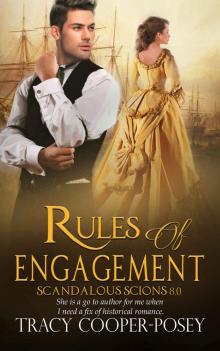 Rules of Engagement
Rules of Engagement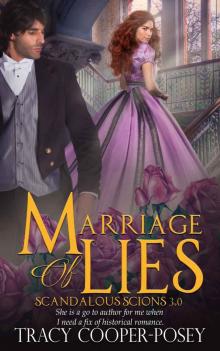 Marriage of Lies
Marriage of Lies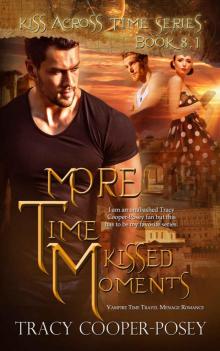 More Time Kissed Moments
More Time Kissed Moments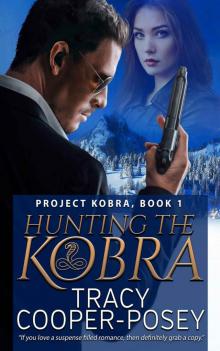 Hunting The Kobra
Hunting The Kobra Black Heart
Black Heart Eva's Last Dance
Eva's Last Dance Solstice Surrender
Solstice Surrender Inconvenient Lover
Inconvenient Lover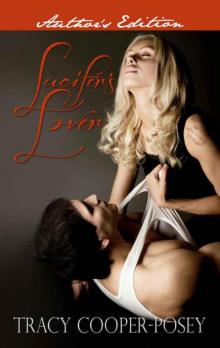 Lucifer's Lover
Lucifer's Lover Wait (Beloved Bloody Time)
Wait (Beloved Bloody Time)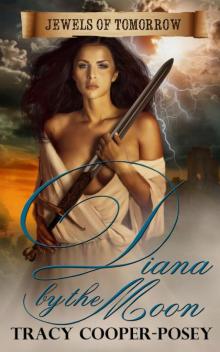 Diana by the Moon
Diana by the Moon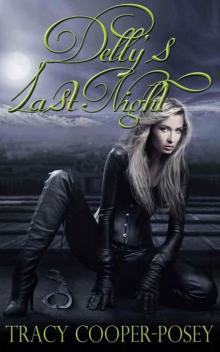 Delly's Last Night (Go Get 'Em Women)
Delly's Last Night (Go Get 'Em Women)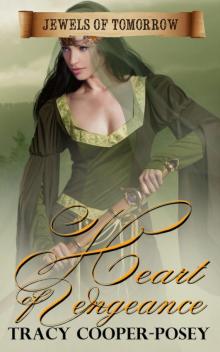 Heart of Vengeance
Heart of Vengeance Law of Attraction
Law of Attraction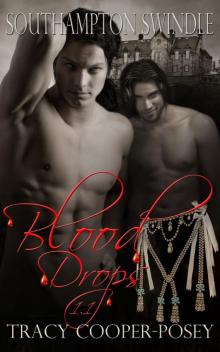 Southampton Swindle
Southampton Swindle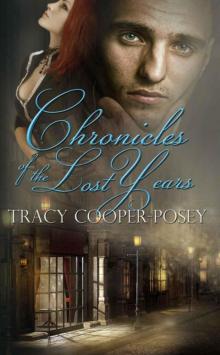 Chronicles of the Lost Years (The Sherlock Holmes Series)
Chronicles of the Lost Years (The Sherlock Holmes Series) V-Day
V-Day Kiss Across Time (Kiss Across Time Series)
Kiss Across Time (Kiss Across Time Series)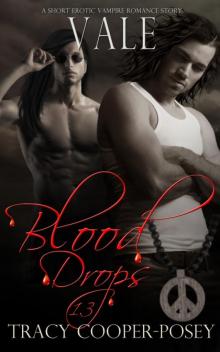 Vale: A Short Erotic Vampire Romance Story
Vale: A Short Erotic Vampire Romance Story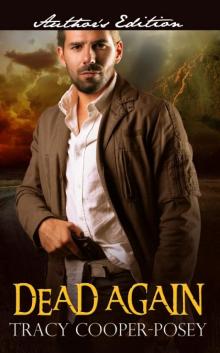 Dead Again: A Romantic Thriller
Dead Again: A Romantic Thriller Dangerous Beauty
Dangerous Beauty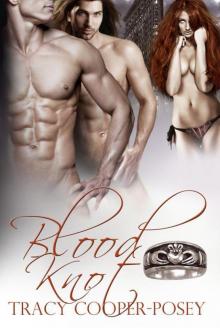 Blood Knot
Blood Knot Vivian's Return
Vivian's Return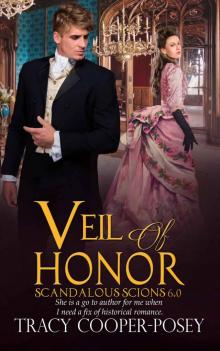 Veil of Honor
Veil of Honor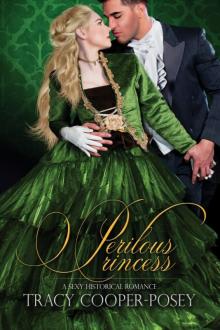 Perilous Princess: A Sexy Historical Romance
Perilous Princess: A Sexy Historical Romance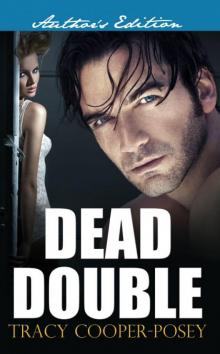 Dead Double
Dead Double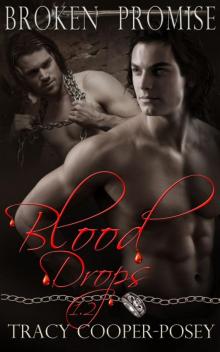 Broken Promise
Broken Promise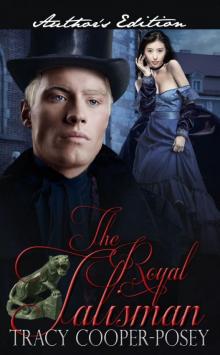 Royal Talisman
Royal Talisman